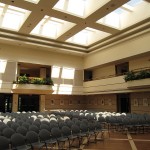From Sideshow to Main Attraction: Transatlantic Perspectives on Digital Rights and Online Privacy
Posted by LisaMarrs on July 26th, 2012

During Wikimania 2012, Jimmy Wales said that he hopes Wikipedia never has to black out again in protest, but that it can if the need arises.
According to Daniel Weitzner, Deputy Chief Technology Officer for Internet Policy at the Office of Science and Technology Policy, the government has kept its hands off of the Internet, allowing innovation to course and the Internet to grow from a small sideshow to the main event, from a small community of researchers to being an indispensable part of global infrastructure. If the Internet were to be an economic sector, he told the audience at the New America Foundation‘s panel discussion on Transatlantic Perspectives on Digital Rights and Online Privacy, it would make up 3.5% of GDP in all OECD countries. Despite this, there is still no Department of the Internet, which is a good thing, Weitzner explained, because of the very horizontal nature of the World Wide Web.
At the same time, we are becoming increasingly aware of the need to create legislation or norms to protect the privacy of the average Internet user. Although it is highly unlikely that an all encompassing, grand public policy treaty on the use and protection of personal information on the Internet will ever be signed, laws should still be made to protect consumer privacy and to let businesses know where boundaries lie. It’s not enough to let companies and people regulate themselves. In order to really make an effort to enforce consumer privacy and protection, the “bully pulpit authority” of government regulation must be used. This does not equate to infringing on the freedom of expression online, which would slow the growth of online businesses and innovation.

Anti-ACTA demonstrators in Tallinn
photo courtesy of Otto de Voogd (CC-BY-SA 2.0)
Three of the four panelists, Konstantin von Notz, Markus Beckedahl, and Jeanette Hofmann, all shared the German perspective on digital rights and online privacy. Beckedahl, the founder of netzpolitik.org, told the amused audience how in Europe, the potential for ACTA (the infamous treaty already signed by the US to strengthen copyright legislation) to be signed by their own governments created a stir. Starting with Poles literally jumping in the cold in protest of the treaty (the story of which was told during Wikimania 2012), demonstrations spread to Germany where tens of thousands showed up to protest any abridgement of online creativity, and then to different parts of Europe. Jeanette Hofmann, Co-Founder and Director of Alexander von Humboldt Institute for Internet and Society, announced her own plans to create a study challenging the pervasive economic assumption that copyright is essential to prevent market failure.
The fourth panelist was one of America’s own, Gigi B. Sohn, the director and co-founder of Public Knowledge, who managed to pull something positive out of the SOPA/PIPA fiasco. Americans, she said, are now more concerned about where their politicians stand on issues touching the internet. Even though SOPA and PIPA went to the backburner in the face of public outrage, Sohn warned that lobbyists are still pushing hard to increase IP protection through the creation of jobs in the IP department and through IP protection personnel in departments where ones haven’t been seen before.
There is a fundamental difference, Sohn emphasized, between legislating the content on the Internet and how that content gets there. The barriers to potential growth and innovation on the internet are not really created by controlling the on-ramps but by controlling the width and scope of the road itself, she said. Wikipedia itself helps to bring awareness to this issue. When Wikipedia blacked out in protest of SOPA and PIPA, Europeans began paying attention to the issue of government control of copyright on the Internet, said Beckedahl.
What we say on the Internet has global reach. The information we spread can touch the lives of people all over the world. Still, five billion people do not have access to the Internet, so there is still tremendous room for growth. In the spirit of providing free access to the sum of human knowledge, the Wikimedia movement should continue to raise awareness about potential legislature that may abridge that access and engage more people in the spread of information and the inevitable creativity and innovation that comes with it.
Lisa Marrs, Outreach & Program Coordination, Wikimedia DC

During Wikimania 2012, Jimmy Wales said that he hopes Wikipedia never has to black out again in protest, but that it can if the need arises.
According to Daniel Weitzner, Deputy Chief Technology Officer for Internet Policy at the Office of Science and Technology Policy, the government has kept its hands off of the Internet, allowing innovation to course and the Internet to grow from a small sideshow to the main event, from a small community of researchers to being an indispensable part of global infrastructure. If the Internet were to be an economic sector, he told the audience at the New America Foundation‘s panel discussion on Transatlantic Perspectives on Digital Rights and Online Privacy, it would make up 3.5% of GDP in all OECD countries. Despite this, there is still no Department of the Internet, which is a good thing, Weitzner explained, because of the very horizontal nature of the World Wide Web.
At the same time, we are becoming increasingly aware of the need to create legislation or norms to protect the privacy of the average Internet user. Although it is highly unlikely that an all encompassing, grand public policy treaty on the use and protection of personal information on the Internet will ever be signed, laws should still be made to protect consumer privacy and to let businesses know where boundaries lie. It’s not enough to let companies and people regulate themselves. In order to really make an effort to enforce consumer privacy and protection, the “bully pulpit authority” of government regulation must be used. This does not equate to infringing on the freedom of expression online, which would slow the growth of online businesses and innovation.

Anti-ACTA demonstrators in Tallinn
photo courtesy of Otto de Voogd (CC-BY-SA 2.0)
Three of the four panelists, Konstantin von Notz, Markus Beckedahl, and Jeanette Hofmann, all shared the German perspective on digital rights and online privacy. Beckedahl, the founder of netzpolitik.org, told the amused audience how in Europe, the potential for ACTA (the infamous treaty already signed by the US to strengthen copyright legislation) to be signed by their own governments created a stir. Starting with Poles literally jumping in the cold in protest of the treaty (the story of which was told during Wikimania 2012), demonstrations spread to Germany where tens of thousands showed up to protest any abridgement of online creativity, and then to different parts of Europe. Jeanette Hofmann, Co-Founder and Director of Alexander von Humboldt Institute for Internet and Society, announced her own plans to create a study challenging the pervasive economic assumption that copyright is essential to prevent market failure.
The fourth panelist was one of America’s own, Gigi B. Sohn, the director and co-founder of Public Knowledge, who managed to pull something positive out of the SOPA/PIPA fiasco. Americans, she said, are now more concerned about where their politicians stand on issues touching the internet. Even though SOPA and PIPA went to the backburner in the face of public outrage, Sohn warned that lobbyists are still pushing hard to increase IP protection through the creation of jobs in the IP department and through IP protection personnel in departments where ones haven’t been seen before.
There is a fundamental difference, Sohn emphasized, between legislating the content on the Internet and how that content gets there. The barriers to potential growth and innovation on the internet are not really created by controlling the on-ramps but by controlling the width and scope of the road itself, she said. Wikipedia itself helps to bring awareness to this issue. When Wikipedia blacked out in protest of SOPA and PIPA, Europeans began paying attention to the issue of government control of copyright on the Internet, said Beckedahl.
What we say on the Internet has global reach. The information we spread can touch the lives of people all over the world. Still, five billion people do not have access to the Internet, so there is still tremendous room for growth. In the spirit of providing free access to the sum of human knowledge, the Wikimedia movement should continue to raise awareness about potential legislature that may abridge that access and engage more people in the spread of information and the inevitable creativity and innovation that comes with it.
Lisa Marrs, Outreach & Program Coordination, Wikimedia DC








